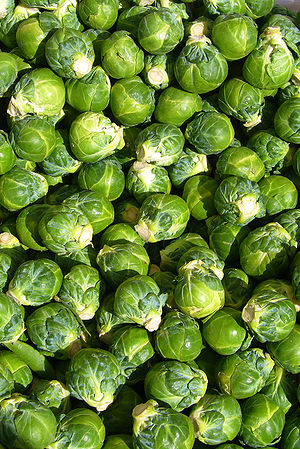| Brussels Sprouts (Photo credit: Wikipedia) |
1. Eat plenty of fiber - namely, vegetables. The human digestive tract was designed for mostly consuming unprocessed plant foods that are loaded with dietary fiber, such as beans, leafy greens, fresh and dried fruits, vegetables and whole grains. High levels of dietary fiber increase both the frequency and quantity of bowel movements, decreasing the transit time of stools, as well as the absorption of toxins from the stool.
2. Drink at least eight to twelve 8-oz. glasses of clean water per day. Hard, dry stools are a classic sign of dehydration. A good rule of thumb is to drink a glass of water when you wake up and then every hour after that.
3. Try adding some wheat or barley grass to your daily routine. Mix two to three teaspoons of a nutrient-rich blend of dehydrated wheat and/or barley grass in water, and have another serving later in the day. These drinks have a restorative action on the intestinal tract and are especially good for constipation, and they also contain many phytonutrients and antioxidants which will support your system during your detox.
| Prune plums on the tree (Photo credit: Wikipedia) |
5. Consume superfoods containing vitamin C. Vitamin C rich foods can help with your detox as well, as they help with food and nutrient absorption. Try parsley, broccoli, bell pepper, strawberries, oranges, lemon juice, papaya, cauliflower, kale, mustard greens, and Brussels sprouts, as they’re all great sources of vitamin C.
Following these tips will help get things moving smoothly, so that your body can eliminate the toxins that are released during your detox and cleanse diet, and restore optimal health.



No comments:
Post a Comment